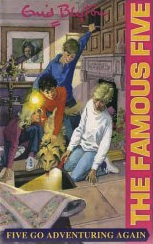Author: David Pogue
This is a technothriller I got way back in the 1993. Back then Pogue was an editor for Macworld magazine (he’s now world famous as the New York Times’ tech editor) and I read it out of curiosity. It seemed a little like he was just taking advantage of his reputation to make a buck selling a novel, but it’s actually a decent book. (I got mine for free with the purchase of a hard drive from APS — a brilliant marketing gimmick.)

Rereading the book now, two decades later, is quite thrilling. It’s extremely dated — hilariously so. For instance, at one point there’s talk of this thing called the “InterNet” which then was limited to big institutions and government agencies. David also is very focused on Apple computers, detailing them in almost every scene (and since this was back when Apple made about five million different models, there’s plenty of variety). It’s also delightfully refreshing to go back in time and remember what was considered state-of-the-art in 1993. Back then it was bulletin-board systems accessed via modems, everyone exchanged data with floppy disks, 8MB was a massive amount of RAM, and a 250MB (megabyte, not gigabyte) external hard drive was considered monstrous.
I especially liked remembering how much of society has changed since then. There were so many things I forgot about: ordering boxed software via mail order companies that charged $3 for overnight shipping, programmers having to be sure their applications were small enough to fit onto a 770KB floppy disk, user groups, printed software manuals, the power and importance of computer magazines (the fictional PowerMac magazine in the book has a circulation of half a million), etc.
The plot of the novel is so tied with tech that it’s unfortunate, as it really dates the story. It’s about a computer virus. It’s rather ironic, as the Mac is famous today for not having viruses, yet the whole novel’s about a Mac virus that’s going to destroy the world. Also, the spread of the virus back then was much more difficult, and the numbers are hilariously small compared to today. Today a virus can spread via an email and infect millions of computers within hours. Back then, it took weeks for it to spread to thousands of computers and yet the novel makes that seem like it’s potentially the end of the world.
There are also some questionable technical flaws. For instance, a significant part of the novel has the virus spreading from Macs to UNIX systems (thereby harming satellite and air traffic control systems). The way this is done is via some sort of Mac-to-UNIX virtualization software, but that makes no sense at all in spreading a virus as it would require all those other systems to also have the virtualization software. (There’s one sentence where it says something about “converting” the code for UNIX, which could allow a virus to be translated and spread, but elsewhere it’s very specific about it being an “interpreter” which means it’s live, on-the-fly translation, not converting the a Mac app to a UNIX standalone app.)
Even stranger is some basic math errors. A key part of the plot is the software company’s potential takeover by a Japanese conglomerate (this was back in the days when Japan had money and was buying up everything in the U.S.). There’s talk that if they don’t repay the $1.2 million investment by Tuesday, the Japanese company will take ownership of the U.S. software company. Yet the company has just sold 40,000 pre-orders of their exciting new software product… at $799 each! With my math, that’s nearly $32 million in income… more than enough to pay back the Japanese investors. Of course that limits the drama, but still seems like an obvious mistake that isn’t explained in the novel.
All that said, the story’s actually pretty good. It’s surprisingly well-written, and it reads quickly, despite being tech heavy — Pogue is excellent at simplifying the tech and explaining it in ways that non-technical people can understand. I also really liked the graphics: there are lots of Mac screenshots, demonstrating various dialog boxes and error messages, as well as BBS transcriptions, emails, computer magazine advertisements, computer source code, etc.
Too much of the drama is forced (the idea that a virus interferes with a military testing of a missile is just ludicrous), some scenes are cliché, and none of the characters are especially memorable, but Pogue does a great job of establishing the Silicon Valley setting and making the 1993 computing world come alive.
Ultimately, this is a minor novel, sadly so tech-specific it’s too dated to be very good as a story, but fascinating as a glimpse into a world most of us have forgotten. I really liked rereading it. I have no idea how easy it is to get a copy of the book these days, but it’s an enjoyable trip down memory lane and worth the read.




